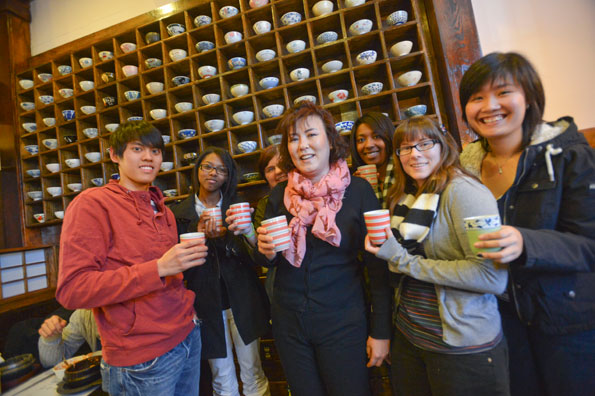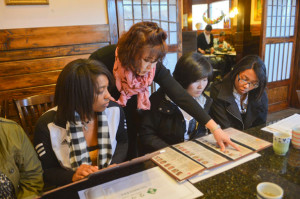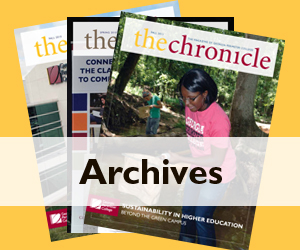
Georgia Perimeter College students taking Eun Shim’s Korean language course enjoy a meal at Jang Su Jang restaurant in Gwinnett County. (Photo by Rod Reilly)
Program Answers Rising Interest in Learning Korean
by Rebecca Rakoczy
Chopsticks fly into fragrant bits of meat and vegetables, as students in Eun Shim’s Korean language class dive into their meals at a Gwinnett County Korean barbecue restaurant. The Georgia Perimeter College students had ordered their food in Korean, eliciting a smile from the waitress as they carefully enunciated words on the menu.
The students were on a field trip for their class in Korean, which is considered one of the nation’s “critical languages” and is growing in popularity. A foreign language is considered critical when it is a non-Western language important to U.S. national security. Examples include Arabic, Chinese, Hindi, Indonesian, Korean, Russian and Turkish. The term “critical language” also can refer to any language less commonly taught in colleges and universities.
Georgia Perimeter College has offered Korean for two years, says Ann Sarnat, critical languages program coordinator on Clarkston Campus. The college is one of only four University System of Georgia institutions offering the language in the Atlanta area; the others are Georgia Tech, Kennesaw State University and Georgia State University. That could change soon, as institutions race to add faculty to meet the demand, Sarnat says.

GPC Korean tutor Eun Shim, center, leads her students in a Korean toast to good health with a cup of tea. (Photo by Rod Reilly)
The United States’ need for non-native Korean speakers for national security and international relations purposes can be seen in headlines of the day. But it is not the only thing driving an increasing interest in the language. Korean has become one of the more popular foreign languages taught at GPC due to a growing following of the country’s serial soap operas and a surging interest in Korean popular music (called “K-Pop”), Sarnat says.
Just one example is South Korean pop star Psy’s record-breaking viral music video “Gangnam Style,” which surpassed 1 billion views last year, a number still on the rise.
Georgia Perimeter College provides a wide array of foreign language courses, with offerings in Arabic, Chinese, French, German, Italian, Japanese, Korean, Portuguese, Russian, Spanish and Swahili. Currently, French, German and Spanish are offered in the traditional classroom format, while Japanese is offered in both the traditional format and through the critical language program, which features small groups of students.
Arabic, Chinese, Russian, Italian, Japanese, Korean, Portuguese and Swahili are offered through the critical language program and attract a diverse student population, Sarnat says. Just seven students—occasionally eight—are allowed in each critical language class.

GPC Korean tutor Eun Shim, center, explains Korean menu items to critical language students, from left, Brittany Askew, Chi Lam and Jequel Wilkes. (Photo by Rod Reilly)
In the Korean class, each student’s motivation for learning the language is different. Kiera Howell, who is taking Korean and Japanese at GPC, says she is “fascinated with Asian languages.” Jequel Wilkes is learning Korean to help her when she visits her father, who is a teacher in Korea. Kat Doffing travels to GPC from Kennesaw to take Korean and Chinese classes to round out her foreign language major. Some students say they are “hooked” on Korean soap dramas and music and take the course to understand the dialog and lyrics better. Steven Taylor of Conyers has relatives who were born in Korea. “I’m around Korean people a lot,” he says. “I’d like to know what they’re saying. Also, I love their music.”
The class is structured so that Shim works as a tutor, creating activities in which the students practice their Korean skills. She does not grade assignments, Sarnat says. Ninety percent of the students’ grades come from their final exams, which are proctored by a University of Georgia professor, who is a co-author of the Korean language textbook used in class.
Using the textbook and a white board filled with Korean symbols, Shim rarely speaks English in class, directing her students to answer her in Korean.
“These students are self-motivated,” she says.
Students regularly demonstrate the truth of that assessment.
“It excites me to learn another language,” Howell says.







Joanna on April 15, 2013 at 4:50 pm.
Thank you for writing such an interesting article about the Korean courses offered at GPC. I’ve often wondered about the structure of the course as well as the motivation behind students learning such an obscure language- other than Gangnam style of course.